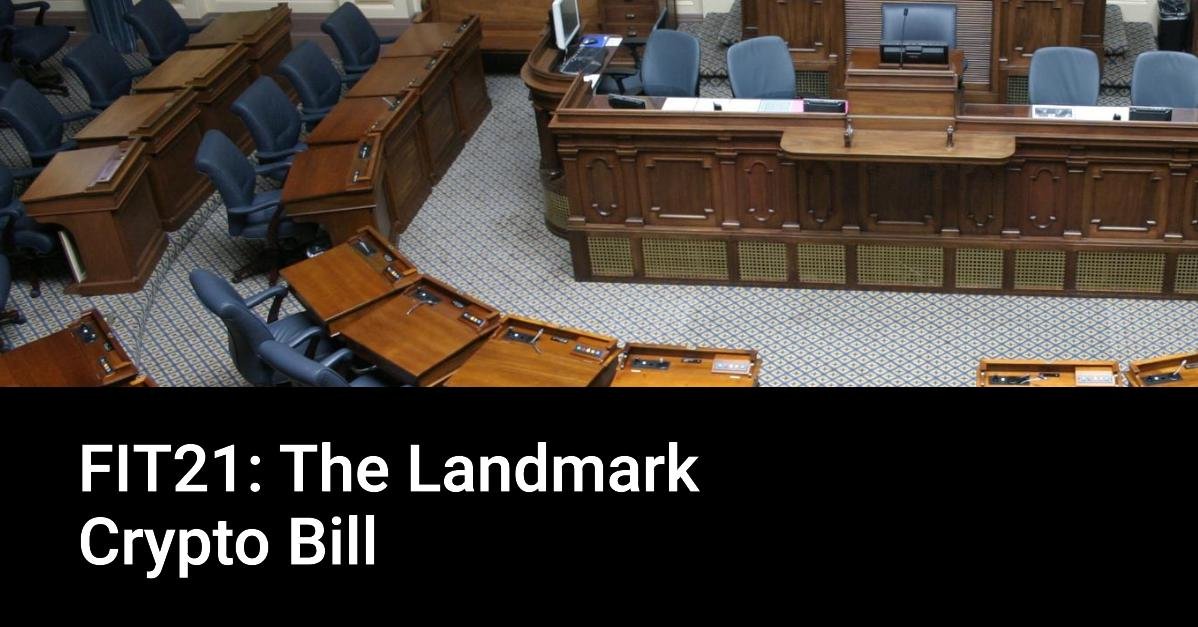Table of Contents
Introduction
The United States House of Representatives is poised to vote on the first standalone crypto market structure bill, the Financial Innovation and Technology for the 21st Century Act (FIT21). This pivotal vote carries immense significance, as it could drastically reshape the regulatory landscape for digital assets in the U.S. For the burgeoning cryptocurrency industry, the outcome of this vote is not just a legislative milestone but a potential game-changer that will define the future of digital asset regulation in the country.
Key Provisions of the FIT21 Act
The FIT21 Act is designed with a clear focus: granting the Commodity Futures Trading Commission (CFTC) more authority over digital assets classified as commodities. This shift in regulatory power aims to create a more defined and structured oversight mechanism for the rapidly evolving crypto market. By delineating jurisdictional boundaries, the bill impacts the Securities and Exchange Commission (SEC) significantly, potentially reducing its oversight over certain digital assets.
One of the bill’s most critical components is its framework for companies operating in the crypto space. It provides a clear set of guidelines to determine whether their assets are securities or commodities, thereby clarifying their primary regulatory body. This provision is expected to reduce the regulatory uncertainty that has plagued the industry, allowing businesses to operate with greater confidence and clarity.
Support for the Bill
Rep. Patrick McHenry, a key proponent of the FIT21 Act, anticipates a “substantial vote” in favor of the bill. This expectation underscores the growing momentum for comprehensive digital asset legislation. The bill has garnered bipartisan support, with both Republicans and a number of Democrats showing their backing.
Rep. Jim Himes and Rep. Ro Khanna, notable supporters, argue that the bill marks an important step forward in regulating the crypto industry. They emphasize the necessity of clear rules to foster innovation while protecting consumers. Similarly, Rep. French Hill highlights the bill’s innovative “5-step test” to define decentralized blockchains and its roadmap for regulators, showcasing a sophisticated approach to handling a complex issue.
The bill’s development has also involved significant engagement with regulatory bodies, including the SEC. This collaboration aims to incorporate valuable feedback and address regulatory concerns, thereby creating a more robust and effective regulatory framework.
Opposition to the Bill
Despite its support, the FIT21 Act faces considerable opposition. Rep. Maxine Waters, a vocal critic, has labeled the bill as “not fit for purpose.” She draws parallels between FIT21 and the Commodity Futures Modernization Act (CFMA), warning of potential harms. Waters’ concerns focus on the bill’s perceived inadequacies in targeting fraud, its sunsetting of disclosure requirements, and ambiguities surrounding “investment contract assets.”
Moreover, a coalition of unions and consumer protection groups has echoed these criticisms, aligning their views with those of the SEC. They argue that the bill could weaken existing securities laws, impacting not only the crypto industry but also non-crypto companies. Their primary arguments include the unclear authority granted to the CFTC and the potential risks posed to consumers beyond the realm of cryptocurrencies.
Arguments in Favor of the Bill
The Blockchain Association, a prominent industry advocate, supports the FIT21 Act, emphasizing the need for clear and defined market regulations. They argue that the current regulatory ambiguity creates confusion and hampers the U.S.’s competitive edge in the global tech race. Clear rules, they contend, are essential for protecting users and consumers, fostering innovation, and maintaining the U.S.’s leadership in the digital economy.
The SEC’s Position
SEC Chair Gary Gensler has publicly opposed the FIT21 Act, raising concerns about potential loopholes for fraudulent activities, such as pump-and-dump schemes. Gensler’s primary focus remains on protecting the investing public. He warns that the bill’s provisions might facilitate noncompliant businesses at the expense of investor protection, which is a core mandate of the SEC.
Conclusion
As the FIT21 Act heads to the House floor, its passage appears likely. However, its journey through the Senate remains uncertain, and it faces opposition from the White House. Despite the challenges, this vote represents a crucial turning point in U.S. crypto regulation. The outcomes of this legislative process will have significant implications for the digital asset industry, potentially setting the stage for its future growth and development in the United States. Whether the FIT21 Act becomes law or not, its introduction and the ensuing debate underscore the urgent need for a comprehensive and clear regulatory framework for digital assets in the modern economy.











